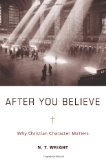Book Review: After You Believe by N. T. Wright

Have you ever thought: “I’m saved, now what?” Or “I know I’m a Christian, but there has to be more to Christian living than waiting around for heaven.” If so, After You Believe: Why Christian Character Matters* is the book for you. Bishop N. T. Wright (Anglican Bishop of Durham, England) has taken up the topic that most Protestants have been shying away from or vilifying for the last 500 years: good works. First Wright picks up with the topic of his last book, Surprised by Hope*, which corrected one of the biggest fables of Christianity: that heaven is the ultimate destination of the Christian. Our ultimate hope is not as disembodied spirits somewhere out there. The true Christian hope is bodily resurrection and inhabiting the new earth and new heavens. After You Believe tells us what difference our ultimate hope makes in living this life in this body (both individual and corporate) on this earth. Because we are called to be priests and one day will rule creation with Christ in the new earth, we need to learn the ways and language of that new world and that new way of life.
The way we learn to live this new life and prepare for our roles in God’s new creation, is through learning and living the Christian virtues of faith, hope, and love. This goes beyond a “keeping the rules” mentality or the “if you go with your heart you can’t go wrong” philosophy. Like learning a new language or learning how to play an instrument, this is not easy or natural at first. But the more we keep committing ourselves to choosing the ways of faith, hope, and love, the easier it becomes until it is second nature. Wright ties the Christian virtues to the fruit of the Spirit: “the fruit of the Spirit is love, joy, peace, greatheartedness, kindness, generosity, faithfulness, gentleness, self control” (p. 194). He notes that “‘the fruit of the Spirit’ does not grow automatically. The nine varieties of fruit do not suddenly appear just because someone has believed in Jesus, has prayed for God’s Spirit, and has then sat back and waited for ‘fruit’ to arrive” (p. 195, emphasis author’s). Just like gardening which takes pruning, watering, mulching, and looking out for blight and mildew to grow plants, we each have to cultivate a life in which the fruit of the Spirit can grow. For those who think that the Spirit’s fruit does come automatically Wright points them to the last characteristic on the list: self-control. No one comes by self-control automatically: it’s something everyone has to work on and develop throughout his or her life.
The final chapter of the book describes how virtue can be practiced, and how we learn to start living as the priests and co-rulers that we will be in the new creation. Wright calls it the virtuous circle, and the circle includes Scripture, stories, examples, community, and practices. It is by engaging with this circle as both individuals and communities, that our character will be transformed and loving God and loving others will become our second nature. These practices will prepare us for the new language and the new way of life that we will have in the new creation. There is an excellent “For Further Reading” appendix for those who want to delve more into virtue, Christian virtue, ethics, and character.
My few criticisms about the book have more to do with style than content. Wright does get repetitive, and you go over a lot of the same ground again. I was also annoyed when he would bring up a subject then say we would get to that later on in the book. It happens numerous times, and I thought: wait till we get to that part before bringing it up. There are also several occasions where he makes a comment, then says something to the effect of, but we can’t go into that here; it’s another book. If those asides are any indication, there are several more books on the way.
Overall I thought this was a good, informative book, and it starts to fill a gaping void in Protestant practice: where do good works and character fit into the Christian life without becoming something we have to do to earn salvation. I recommend it for anyone who wants to know more about how to live as a Christian in this body, in this world, at this time.
*Affliate Link
Disclosure of Material Connection: I received the product mentioned above for free by The Ooze Viral Bloggers in the hope that I would mention it on my blog. I am disclosing this in accordance with the Federal Trade Commission’s 16 CFR, Part 255: “Guides Concerning the Use of Endorsements and Testimonials in Advertising.” This article has been reposted at The Ooze Viral Bloggers.